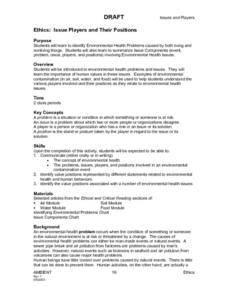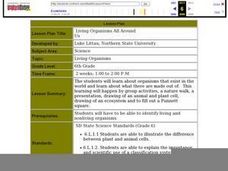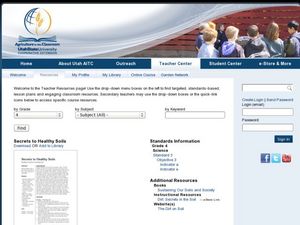Curated OER
Living vs. Non-Living Things
Fourth graders describe the characteristics that determine if something is living, dead, or non-living. They determine the difference between living and non-living things. Students determine if an object is living or non-living and...
Curated OER
Going on a Living and Nonliving Hunt
Third graders explore various objects and organisms to begin to distinguish between things that are living, things that were once-living, and things that are nonliving.
Curated OER
Hey Diddle Diddle
Students discuss their needs to grow and be healthy. They listen as the teacher explains the definition of "organisms" and "nonliving" Students identify organisms in the classroom. They listen to and view a poster illustrating the "Hey...
Curated OER
Living and Nonliving
Students use their senses to record and collect data. In How Do I Classify Things in My World?, students practice classifying objects as living or nonliving. In Is it Real Or Pretend?, students group objects as real or pretend. In What...
Curated OER
Characteristics of Living Things
Seventh graders identify the characteristics of living and non-living things. In this biology lesson, 7th graders define vocabulary words as they go through the lesson. They answer a crossword puzzle after class discussion.
Curated OER
Living and Non-Living Things
In this worksheet on living and non-living things, students categorize items, cutting and pasting their pictures under the correct heading.
Curated OER
Investigation 2 - Greenhouses
Third graders set up a miniature greenhouse to help them explain how nonliving things affect the growth of living things.
Curated OER
Cricket Wars
Third graders explore living and nonliving things in a garden environment. In this garden environment instructional activity, 3rd graders study the effects of crickets in a garden. Students explore the interaction between living and...
Curated OER
Making a Mini Worm Habitat
Students explore the process of converting organic waste into usable fertilizer. They observe how living and nonliving things interact with one another by making a mini-worm habitat.
Curated OER
Bacteria: The good, the bad, the ugly
Seventh graders conduct an experiment. In this bacteria lesson plan, 7th graders list living and nonliving things and brainstorm the characteristics they share. Students are divided into two groups where they put samples of hand soap...
Curated OER
Issue Players and Their Positions
Students identify Environmental Health Problems caused by both living and nonliving things. They summarize Issue Components (event, problem, issue, players, and positions) involving environmental health issues such as contamination in...
Curated OER
It's Alive
First graders critically analyze living and nonliving objects, then develop a list of characteristics to classify objects on a science walk. They make a book to close out the lesson.
Curated OER
Classifying Living and Non-Living Objects
Students investigate living organisms and define the properties of a living species. In this life characteristic lesson plan, students examine plants in their class and discuss whether or not they are alive. Students create a living...
Curated OER
C.M. Beg
First graders are introduced to a pretend boy named C.M. Beg. The initials of the boy be a mnemonic device to help students explain the basic characteristics of living things.
Curated OER
Living Organisms All Around Us
Sixth graders study organisms that exist in the world and what they are made up of. They participate in a nature walk, a presentation, a drawing of an animal and plant cell, draw a ecosystem, and fill out a Punnett square.
Curated OER
It's Alive! Or is it?
Students differentiate the characteristics of living and nonliving things. In this life science lesson, students compare and contrast robots and living things. Given an object, they decide whether it's is living or not and defend their...
Curated OER
It's Alive
Students identify the differences between a nonliving and living thing. They describe what is needed for any living thing to survive. They create one page for the class book identifying why the object is a living thing.
Curated OER
Secrets to Healthy Soil
Fourth graders explore needed mineral nutrients for healthy soil. In this soil lesson, 4th graders investigate how living and nonliving elements combine to contribute to fertile soil development.
Curated OER
IDENTIFYING AND SORTING BEARS
Students study the difference between living and nonliving bears by classifying pictures of bears and placing them on the appropriate posterboard. Given pictures of bears, students recognize types of bears by placing the pictures correctly.
Curated OER
Is It Alive?
First graders explore living things and their habitats. They create an original It's Alive! book to demonstrate what they have learned.
Curated OER
What on Earth?
Second graders investigate the different living and nonliving things they can find on Earth. In this life science lesson, 2nd graders record their observations as they dig into the soil. They examine them under the magnifying glass and...
Curated OER
Waterdrops
For this science worksheet, students learn about water resources and watersheds by reading and answering questions in this 8 pages newsletter. Students learn about salt vs. fresh water, discover the protective role of estuaries, learn...
Curated OER
Food Chain/Food Web
Students explore ecosystems. In this ecology lesson, students read an article explaining ecosystems. Students create a visual organizer with index cards using components of various ecosystems.
Curated OER
The Seven Characteristics of Life
Third graders investigate the characteristics of living and nonliving things. They conduct a research quest in order to identify the seven characteristics of life. Then students pick one aspect and use it to create a song meant to be...
Other popular searches
- Living and Nonliving Things
- Living vs Nonliving Things
- Living or Nonliving Things
- Living Nonliving Things
- Living/nonliving Things

























